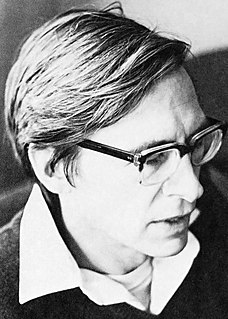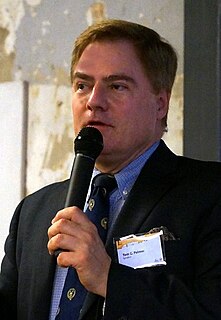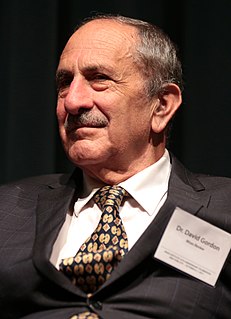The Austrian School is a heterodox school of economic thought that advocates strict adherence to methodological individualism, the concept that social phenomena result exclusively from the motivations and actions of individuals. Austrian school theorists hold that economic theory should be exclusively derived from basic principles of human action.
Classical liberalism is a political tradition and a branch of liberalism that advocates free market and laissez-faire economics; civil liberties under the rule of law with especial emphasis on individual autonomy, limited government, economic freedom, political freedom and freedom of speech. It gained full flowering in the early 18th century, building on ideas stemming at least as far back as the 13th century within the Iberian, Anglo-Saxon, and central European contexts and was foundational to the American Revolution and "American Project" more broadly.

Friedrich August von Hayek, often referred to by his initials F. A. Hayek, was an Austrian–British economist, legal theorist and philosopher who is best known for his defense of classical liberalism. Hayek shared the 1974 Nobel Memorial Prize in Economic Sciences with Gunnar Myrdal for their work on money and economic fluctuations, and the interdependence of economic, social and institutional phenomena. His account of how changing prices communicate information that helps individuals coordinate their plans is widely regarded as an important achievement in economics, leading to his prize.

John Bordley Rawls was an American moral, legal and political philosopher in the liberal tradition. Rawls received both the Schock Prize for Logic and Philosophy and the National Humanities Medal in 1999, the latter presented by President Bill Clinton, in recognition of how Rawls's work "revived the disciplines of political and ethical philosophy with his argument that a society in which the most fortunate help the least fortunate is not only a moral society but a logical one".

Distributive justice concerns the socially just allocation of resources. Often contrasted with just process, which is concerned with the administration of law, distributive justice concentrates on outcomes. This subject has been given considerable attention in philosophy and the social sciences.

A Theory of Justice is a 1971 work of political philosophy and ethics by the philosopher John Rawls (1921-2002) in which the author attempts to provide a moral theory alternative to utilitarianism and that addresses the problem of distributive justice. The theory uses an updated form of Kantian philosophy and a variant form of conventional social contract theory. Rawls's theory of justice is fully a political theory of justice as opposed to other forms of justice discussed in other disciplines and contexts.

Robert Paul Wolff is an American political philosopher and professor emeritus at the University of Massachusetts Amherst.

The Road to Serfdom is a book written between 1940 and 1943 by Austrian-British economist and philosopher Friedrich Hayek. Since its publication in 1944, The Road to Serfdom has been popular among liberal and conservative thinkers, and remains referenced in modern discourse. It has been translated into more than 20 languages and sold over two million copies. The book was first published in Britain by Routledge in March 1944, during World War II, and was quite popular, leading Hayek to call it "that unobtainable book", also due in part to wartime paper rationing. It was published in the United States by the University of Chicago Press in September 1944 and achieved great popularity. At the arrangement of editor Max Eastman, the American magazine Reader's Digest published an abridged version in April 1945, enabling The Road to Serfdom to reach a wider non-academic audience.

Tom Gordon Palmer is an American libertarian author and theorist, a Senior Fellow at the Cato Institute and Vice President for International Programs at the Atlas Network.

Jesús Huerta de Soto Ballester is a Spanish economist of the Austrian School. He is a professor in the Department of Applied Economics at King Juan Carlos University of Madrid, Spain and a Senior Fellow at the Mises Institute.
In the United States, libertarianism is a political philosophy promoting individual liberty. According to common meanings of conservatism and liberalism in the United States, libertarianism has been described as conservative on economic issues and liberal on personal freedom, often associated with a foreign policy of non-interventionism. Broadly, there are four principal traditions within libertarianism, namely the libertarianism that developed in the mid-20th century out of the revival tradition of classical liberalism in the United States after liberalism associated with the New Deal; the libertarianism developed in the 1950s by anarcho-capitalist author Murray Rothbard, who based it on the anti-New Deal Old Right and 19th-century libertarianism and American individualist anarchists such as Benjamin Tucker and Lysander Spooner while rejecting the labor theory of value in favor of Austrian School economics and the subjective theory of value; the libertarianism developed in the 1970s by Robert Nozick and founded in American and European classical liberal traditions; and the libertarianism associated with the Libertarian Party, which was founded in 1971, including politicians such as David Nolan and Ron Paul.
Right-libertarianism, also known as libertarian capitalism or right-wing libertarianism, is a libertarian political philosophy that supports capitalist property rights and defends market distribution of natural resources and private property. The term right-libertarianism is used to distinguish this class of views on the nature of property and capital from left-libertarianism, a type of libertarianism that combines self-ownership with an egalitarian approach to natural resources. In contrast to socialist libertarianism, right-libertarianism supports free-market capitalism. Like most forms of libertarianism, it supports civil liberties, especially natural law, negative rights, the non-aggression principle, and a major reversal of the modern welfare state.
Libertarian conservatism, also referred to as conservative libertarianism and conservatarianism, is a political philosophy that combines conservatism and libertarianism, representing the libertarian wing of conservatism and vice versa.
Consequentialist libertarianism, also known as consequentialist liberalism or libertarian consequentialism, is a libertarian political philosophy and position that is supportive of a free market and strong private property rights only on the grounds that they bring about favorable consequences such as prosperity or efficiency.
Articles in social and political philosophy include:
Glen Francis Newey was a political philosopher, last acting as a Professor of Practical Philosophy at the University of Leiden. He previously taught in Brussels at the Université Libre de Bruxelles and until 2011 was Professor in the School of Politics, International Relations & Philosophy at Keele University, Staffordshire, England. He was a prominent member of the "Realist" school of political philosophers which also includes such figures as Bernard Williams, John N. Gray, and Raymond Geuss. Newey also wrote extensively about toleration, casting doubt on whether it remains a coherent political ideal in modern liberal-democratic societies.

David Gordon is an American libertarian philosopher and intellectual historian influenced by Rothbardian views of economics. Peter J. Boettke, in his Reason Foundation "Reason Papers," Issue No. 19, Fall 1994, describes Gordon as "a philosopher and intellectual historian who is deeply influenced by the Rothbardian strand of economics." He is a senior fellow at the Ludwig von Mises Institute and editor of The Mises Review.
Liberalisme: Politisk frihet fra John Locke til Amartya Sen is a 2009 Norwegian language anthology edited by Lars Svendsen. The book focuses on the history of liberalism and libertarianism in general, and contains a sample of liberal thinkers from John Locke to Amartya Sen. It was published by Universitetsforlaget with financial support from Civita and Fritt Ord. The book received mixed reviews by critics.
Ronald Hamowy was a Canadian academic, known primarily for his contributions to political and social academic fields. At the time of his death, he was professor emeritus of Intellectual History at the University of Alberta in Edmonton, Canada. Hamowy was closely associated with the political ideology of libertarianism and his writings and scholarship place particular emphasis on individual liberty and the limits of state action in a free society. He is associated with a number of prominent American libertarian organizations.
Neoclassical liberalism, also referred to as Arizona School liberalism and bleeding-heart libertarianism, is a libertarian political philosophy that focuses on the compatibility of support for civil liberties and free markets on the one hand and a concern for social justice and the well-being of the worst-off on the other. Adherents of neoclassical liberalism broadly hold that an agenda focused upon individual liberty will be of most benefit to the economically weak and socially disadvantaged.









